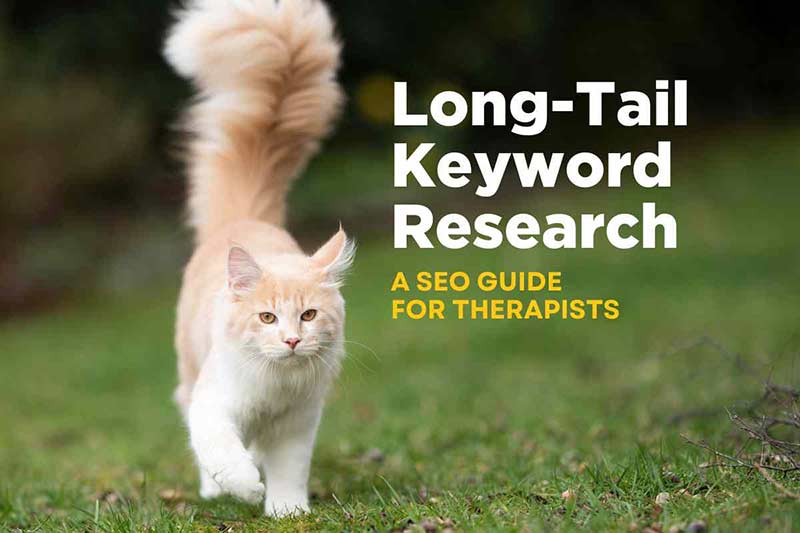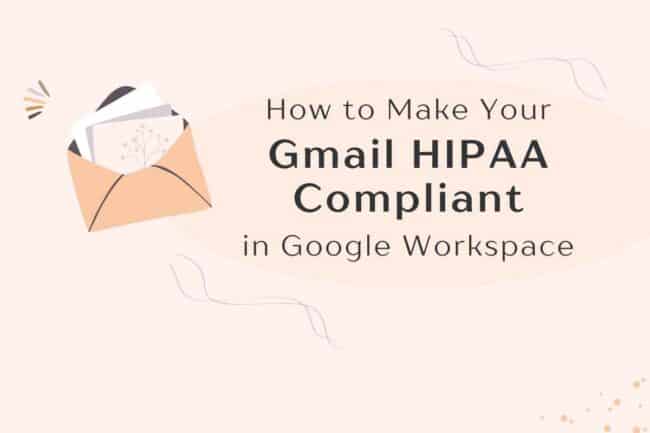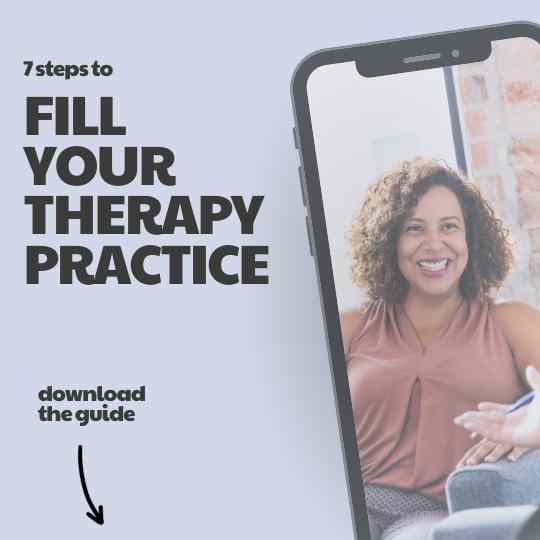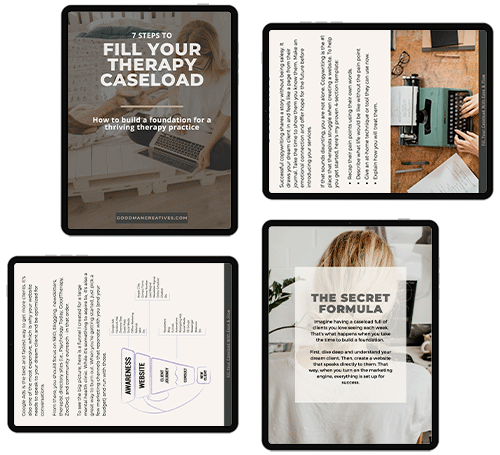Choosing the best long-tail keywords for therapists is an art form. Sure, you want to rank for searches like “anxiety therapist near me” and “best online CBT therapist.” But, to get there, you need to take a more integrative approach.
Long-tail keywords are longer, more specific phrases that have lower search volume but higher conversion rates. If you are new to the world of search engine optimization, it might make more sense to skip this article and jump right to my comprehensive overview of SEO for therapists. But, if you already understand the basics of getting found on Google and want to dive into the world of long-tail keyword research, then keep reading to learn:
- Why are long-tail keywords so essential for SEO?
- How do you find the best long-tail keywords?
- What long-tail keywords are your potential LOCAL clients searching for?
- How to incorporate your keywords into your website’s content in a natural and effective way, which is crucial to improving your search engine ranking.
A Brief Overview of Therapist SEO
SEO is a core part of marketing for therapists. It is the process of improving your website’s visibility in search engine results pages (SERPs). This is accomplished by focusing on three key areas:
- Keyword research — the process of identifying the keywords that your potential clients are using to search for therapy services.
- On-page optimization — having a fast website that works on all devices and optimizing your website’s content, meta tags, and URLs for your target keywords.
- Off-page optimization — building backlinks to your website from other high-authority websites.
What is Local SEO
Local SEO is an important aspect of SEO for therapists. Local SEO involves optimizing your website for local search queries. This includes using location-specific keywords, creating local business listings, and building backlinks from local websites. By optimizing your website for local search, you can attract more clients from your local area. A few key areas to consider include:
- Google Business Page — Make sure you have one and it is optimized for your niche.
- NAP Consistency — NAP stands for Name, Address, and Phone number. Consistency of this information across the internet (your website, social media profiles, directory listings, etc.) is vital for local SEO. Inconsistencies can confuse search engines and potential clients, negatively impacting your search ranking.
- Local Keywords on Your Website — For example, “anxiety therapist in [City Name]” or “family counseling services in [City Name].” This helps search engines understand what services you offer and where you are located, making it more likely to show your site to users in your area.
- Local Backlinks — Obtaining backlinks from local businesses, organizations, and media outlets can significantly boost your local SEO efforts. These backlinks act as endorsements, increasing your site’s authority and relevance in local search results.
- Local Content — Creating content that is relevant to your local area can also improve local SEO. Blog posts about local events, community issues, or local resources for mental health can increase your visibility to local audiences.
Crafting Your Keyword Strategy
Keyword research is a cornerstone of your search engine optimization (SEO) and digital marketing strategy, acting as the critical foundation for building a successful online presence. It involves identifying the terms and phrases your potential clients use when searching for services or information online, especially those related to your therapy practice and specialties.
Through keyword research, you can uncover the search behaviors of your target audience, including the specific queries and language they use. This not only aids in optimizing your website content for better search engine rankings but also ensures your content resonates with the needs and interests of potential clients. By understanding and leveraging the right keywords, you can boost your online visibility, drive more traffic to your site, and, most importantly, connect with more therapy clients seeking your services.
Identifying Long-Tail Keywords for Therapists
Long-tail keyword for therapists means focusing on uncovering longer, more specific phrases that your potential clients are using to search for therapy services online. Unlike “regular” keyword research, which often targets shorter, more competitive terms, long-tail keyword research delves into the specifics of what your audience is looking for, such as “trauma-informed cognitive behavioral therapy in Portland” or “how to manage anxiety without medication.”
These phrases are usually less competitive but highly targeted, making it easier for you to rank in search engine results. By incorporating long-tail keywords for therapists into your content, you can attract visitors who are further along in their decision-making process, increasing the likelihood that they’ll choose your services. This approach allows you to connect deeply with the needs and queries of your target audience, providing them with the exact answers they’re searching for.
While traditional “high-level” keyword research aims to identify a broad range of popular keywords, long-tail keyword research zeroes in on the niche, specific terms that directly relate to the services you offer and the unique needs of your potential clients.
This specificity means that long-tail keywords often have a lower search volume but a much higher conversion rate, as they capture the intent of searchers more accurately. For your therapy practice, leveraging long-tail keywords means you’re not just aiming to increase traffic to your site; you’re looking to attract the right kind of traffic—people who are actively seeking the specialized services you provide. Embracing long-tail keyword research helps you stand out in a crowded online space, ensuring that your practice reaches those who need your expertise the most.
Examples of Long-Tail Therapist Keywords With User Intent
Each of these long-tail keywords is designed to attract a specific audience, helping therapists to connect with potential clients who are actively seeking information and support on these topics. When creating content around these keywords, it’s important to provide in-depth, valuable insights that reflect your expertise and how your services can meet the needs of these individuals.
- “Coping strategies for anxiety in young adults” – This keyword targets a specific demographic and concern, making it ideal for therapists specializing in anxiety disorders and adolescent therapy.
- “Benefits of mindfulness meditation for stress relief” – Perfect for therapists who incorporate mindfulness or meditation into their practice, addressing a common issue many people face.
- “Managing relationship conflicts through communication therapy” – A great topic for couples therapists or those focusing on communication issues within relationships.
- “Overcoming trauma with cognitive behavioral therapy (CBT)” – Targets individuals looking for specific therapeutic techniques to deal with trauma, appealing to therapists specialized in CBT.
- “Strategies for dealing with grief after losing a loved one” – A helpful topic for grief counselors or therapists focusing on loss, providing value to people in a sensitive time of need.
- “The impact of social media on teen self-esteem” – Appeals to child and adolescent therapists, as well as parents looking for insights on how to support their teenagers.
- “Effective parenting techniques for children with ADHD” – Offers valuable content for therapists who work with children and their families, focusing on ADHD.
- “How to build resilience in the face of adversity” – A broad yet specific topic that can appeal to various types of therapists, including those specializing in positive psychology.
- “The role of therapy in treating chronic depression” – Targets individuals suffering from long-term depression, highlighting how therapy can offer support and treatment options.
- “Navigating the challenges of LGBTQ+ relationships” – An essential topic for therapists who provide services to the LGBTQ+ community, focusing on relationship dynamics within this group.
Incorporating Keywords into Your Content
Incorporating keywords naturally into your content is crucial for ensuring that your therapist website not only ranks well in search engine results but also resonates with your potential clients. Start by understanding the specific terms and phrases that your target audience uses when searching for therapy services like yours. Once you have a list of relevant keywords, including both short-tail and long-tail phrases, the key is to weave them into your content in a way that feels organic and enhances the reader’s experience.
For instance, if you specialize in anxiety therapy, phrases like “managing anxiety,” “anxiety coping strategies,” or “therapy for anxiety in [Your City]” should appear naturally within the flow of your articles, blog posts, and even your website’s homepage and service pages. Always prioritize context and readability; your content should inform, engage, and support your readers, with keywords enhancing the message rather than detracting from it.
As you create or update content, think about where keywords fit most naturally.
Blog posts offer a great opportunity to delve into specific topics, such as “Tips for Finding the Right Anxiety Therapist in [Location],” where you can naturally incorporate both general and location-based long-tail keywords. Use headings and subheadings to include keywords that summarize the sections, making it easier for both readers and search engines to grasp the main points of your content. Similarly, service pages and FAQs provide a natural setting for keywords, allowing you to describe your services while seamlessly integrating search terms that potential clients might use to find you.
Remember, the ultimate goal is to serve your audience’s needs first and foremost. Keywords should never compromise the quality or the authenticity of your content. Instead, they should help to clarify your message and make it more accessible to those searching for your expertise. By maintaining a balance between keyword optimization and genuine, valuable information, you’ll not only attract more visitors to your site but also build trust and credibility with potential clients, setting the foundation for a successful therapy practice.
Frequently Asked Questions
What is the difference between SEO and SEM?
Search Engine Optimization (SEO) is the process of optimizing your website to rank higher in organic search engine results. On the other hand, Search Engine Marketing (SEM) is a paid advertising strategy to appear at the top of search engine results pages (SERPs). While SEM can provide quick results, it can be expensive and requires ongoing investment. In contrast, SEO is a long-term strategy that can help you attract more traffic to your website without ongoing investment.
How can therapists optimize their online presence with effective long-tail keywords?
Therapists can optimize their online presence by using effective long-tail keywords in their website content, blog posts, and meta descriptions. Long-tail keywords are more specific and targeted than short-tail keywords, which can help you attract more qualified traffic to your website. By using long-tail keywords, you can also improve your website’s relevance and authority, which can help you rank higher in search engine results.
What strategies should mental health professionals use to identify long-tail keywords for SEO?
To identify long-tail keywords for SEO, mental health professionals should start by brainstorming topics related to their practice. Then, they can use keyword research tools like Google Keyword Planner, Ahrefs, and SEMrush to identify long-tail keywords that have low competition and high search volume. It’s also important to consider the searcher’s intent and use conversational language in your content.
How long does SEO take to work?
SEO is a long-term strategy that can take several months to see results. It’s important to remember that SEO is not a one-time effort, but an ongoing process that requires regular updates and optimizations. However, by using effective long-tail keywords and following best practices, you can improve your website’s visibility and attract more traffic over time. Here’s an article I wrote about how long SEO takes to work.
Which tools are recommended for therapists to research long-tail keywords for their practice?
There are several tools that therapists can use to research long-tail keywords for their practice, including Google Keyword Planner, Ahrefs, SEMrush, Ubersuggest. and Moz Keyword Explorer. These tools can help you identify long-tail keywords that are relevant to your practice and have low competition and high search volume.
What are the benefits of using long-tail keywords over short-tail keywords in therapy-related content?
Using long-tail keywords in therapy-related content can help you attract more qualified traffic to your website and improve your website’s relevance and authority. Long-tail keywords are more specific and targeted than short-tail keywords, which can help you rank higher in search engine results and attract visitors who are more likely to convert into clients.
How can conversational long-tail keywords improve engagement for therapists’ websites?
Conversational long-tail keywords are phrases that mimic the way people speak in natural language. By using conversational long-tail keywords in your website content, you can improve engagement and make your content more accessible to your audience. Conversational long-tail keywords can also help you rank higher in voice search results, which is becoming increasingly important as more people use voice assistants like Siri and Alexa.
What are some examples of long-tail keywords that can help therapists stand out in directories?
Examples of long-tail keywords that can help therapists stand out in directories include “couples therapy for communication issues,” “anxiety therapy for new moms,” and “depression counseling for LGBTQ+ individuals.” By using specific and targeted long-tail keywords in your directory listings, you can attract more qualified traffic to your website and improve your chances of converting visitors into clients.




















